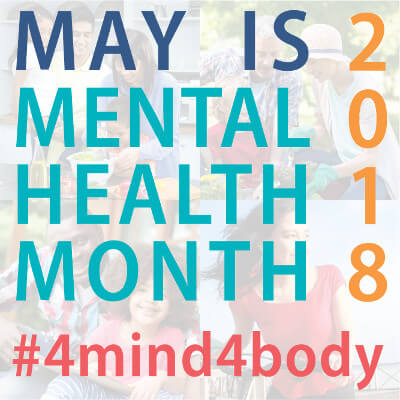Mental Health Awareness Month: Body and Mind
 During May, we recognize Mental Health Awareness Month. This observance brings awareness to mental illnesses and identifies and shares resources to help those who are living and working with mental illness.
During May, we recognize Mental Health Awareness Month. This observance brings awareness to mental illnesses and identifies and shares resources to help those who are living and working with mental illness.
This year's theme, Fitness #4Mind4Body, challenges us to understand that what we do physically has an impact on our mental health. Paying attention to both your physical health and your mental health may help you achieve overall wellness as you pursue goals on the path to recovery and work.
To learn more about your physical and mental health and find advice on how to take care of your body and mind, check out Mental Health America's (MHA) tool kit, which includes fact sheets. In their fact sheet series, you can learn more about nutrition's effect on depression and nutrients for better health, how exercise affects hormone and chemical production that affects mood, the importance of getting a good night's sleep, and more.
#4Mind4Body Challenge
Once you check out the tips, you may want to join in MHA's #4Mind4Body Challenge. The goal of the challenge is to make small changes to your habits that may have a major impact on your mental and physical health. To help keep you on track, they invite you to share your successes on social media and celebrate small changes with the community.
Challenges vary from #MindfulMonday, which asks you to set aside a few minutes of your day to practice being mindful, focus on your breathing and meditate, or #WorkplaceWednesday, which challenges you to create a healthier work setting for yourself by encouraging you to organize your space and take breaks from your computer screen.
Ticket to Work
National Observance
Recently, President Trump issued a proclamation recognizing May as National Mental Health Awareness Month:
"This month, and always, we pledge to strive to eliminate the stigma of mental illness by increasing awareness for all Americans that these illnesses are common and treatable, and that recovery is possible. Through these efforts, our neighbors, co-workers, family, and friends affected by mental illness will know that there is hope for recovery and hope for healthier, more productive lives."
During May, you can also check out some of our previous posts to find tips for staying healthy and managing stress as you look for a job. Plus, find out how Social Security's Ticket to Work (Ticket) program has helped people with mental illness find a path to work and financial independence and recovery:
- Cherie, who has Post Traumatic Stress Disorder, eased her way back to the workplace with support from her Ticket program service provider.
- Lisa wanted to support her family, but her agoraphobia prevented her from working. Using her Ticket, she now works from home and is financially independent.
- Lori has come a long way from the little girl who was paralyzed with fear. Her volunteer work caught the attention of an employer, and today, she works as a Senior Marketing Liaison.
Social Security's Ticket program supports career development for people ages 18 through 64 who receive Social Security disability benefits (SSI or SSDI) and want to work. The Ticket program is free and voluntary. It helps people with disabilities move toward financial independence and connects them with the services and support they need to succeed in the workforce.
Learn more
To learn more, you can call the Ticket to Work Help Line at 866-968-7842 or 866-833-2967 (TTY) Monday through Friday, 8 a.m. to 8 p.m. ET. Ask a representative to send you a list of service providers or find providers on your own with the Ticket program Find Help tool.